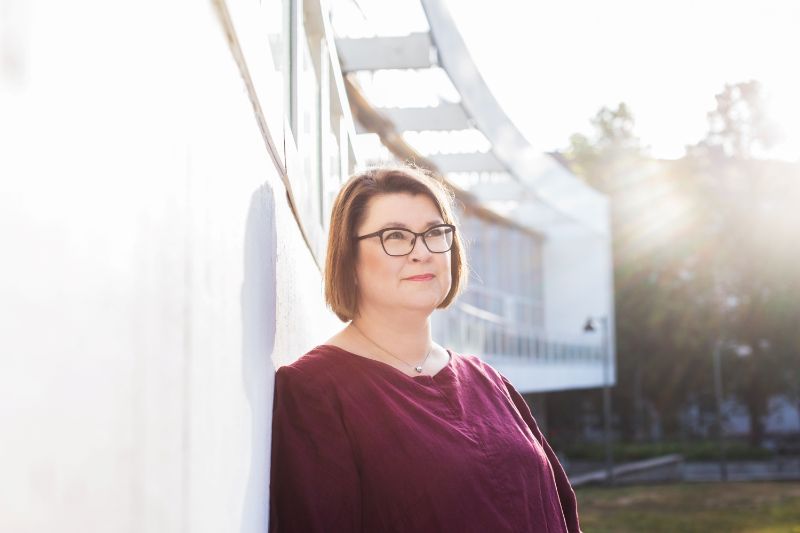Senior specialist, well-being at work
"I am one of the professionals of the Finnish Institute of Occupational Health who improve working life and help people feel better in their work. This makes my work very significant, ethically rewarding and inspiring."

- Liisa Puskala
- Senior Specialist at the Finnish Institute of Occupational Health.
- Graduated Master of Psychology from the University of Helsinki.
- 25 years of work experience in the field.
Briefly explain what you do for a living.
I work as an instructor for well-being at work coachings, in the training services of the Finnish Institute of Occupational Health. I organise training for different work communities online and create various kinds of training materials for online and virtual environments. In addition, I communicate about the themes of well-being at work in social media and give interviews to different media. I have been involved in podcasts, news and morning shows.
How have you ended up in the profession of your choice?
As a child, I practised figure skating, and my first dream profession was the work of a skating coach. On my senior year at upper secondary school, I moved from skater to coach. As a coach, I was particularly interested in the psychological aspect of sports performance. Inspired by this, I decided to study psychology. After starting my studies, I worked as a coach for several more years.
Later, I started coaching without skates. In psychology studies, I completed my practical training in working life coaching at an adult education institution. I worked there for 18 years. I was able to do multidisciplinary work and develop professionally. The themes of well-being at work have always been close to my heart. That is why I applied to the Finnish Institute of Occupational Health, where I now work for the fourth year.
Describe your typical working day or week.
I organise theme lectures, webinars and workshops for companies and other workplaces. I plan and implement events and keep in touch with customers. My coaching work mainly takes place online, and going on-site is rare today.
What kind of work environment or working hours do you have?
I work mainly at the office because there is a studio for webinars. Occasionally, I work remotely at home and sometimes meet customers in conference rooms and hotel meeting rooms.
My working hours are very flexible. I can work between 7 a.m. and 9 p.m. Typically, I work between 8 a.m. and 4 p.m. If the working day includes planning, I sometimes do the work in two parts: I take a longer lunch hour and work longer in the evening.
What kind of competence or qualities are required in the profession?
This work requires educational and pedagogical skills. One must also have strong expertise on the topic to be taught. For me, it is the understanding of human activity, or psychological knowledge. All kinds of experience during my career brings a valuable perspective to my work.
Interest in different professions is important, as I train miners and managers of large global companies and everyone in between. The continuing education on facilitation that I completed after the university, as well as the business coach degree, have brought useful skills to my daily life. The development of artificial intelligence and digitalisation requires continuous studies and digital skills.
What is the best thing about your profession?
The best part of this work is the opportunity to have a positive impact on the world. I am one of the professionals of the Finnish Institute of Occupational Health who improve working life and help people feel better in their work. This makes my work very significant, ethically rewarding and inspiring. I also like the fact that I am able to rhythm my own work. The tight periods are counterbalanced by calmer weeks.
What are the downsides of the profession or what seems challenging?
Sometimes the timetables are decided on my behalf six months in advance, and then it is impossible to know whether I have a voice on that day, for example, because of my allergy. It would be good if I could plan my working days in advance, so that they would not become too burdensome. I must constantly battle with the calendar. It is challenging to delegate my work to a substitute because the work requires a specific type of competence.
What would you tell a person considering the profession of a psychologist or senior specialist?
I recommend studying psychology, as in addition to clinical work, psychological competence can be utilised, for example, in developing information systems and the workplace atmosphere. Psychology studies can be completed at the Open University alongside one's own work. Many become interested in studying occupational psychology, even at an older age.
How do you see the future of your profession?
I see the future of the profession bright, as psychological understanding is appreciated and the need for psychologists is constantly increasing. Expertise in psychology is increasingly needed, for example, in HR tasks and in the development of management.
There is also a demand for competence and learning professionals, as learning guidance is becoming part of various types of work. For this reason, guidance competence is a useful skill to supplement one's own competence in any profession.
Photo: Annukka Pakarinen
